In the valley of the shadow of death, everything turns upside down, and yet somehow you have to go on with your daily life. The wars in Ukraine and the Middle East have been challenging and testing the faith of Christian women. They are among the most vulnerable victims of armed conflicts. A conference in Lebanon in early April gave voice to the testimonies of women who have persevered in war situations, often out of the public eye. Tímea Tövissi, one of the Hungarian participants, a pastor in Transcarpathia, Ukraine, shared her experiences and impressions with the weekly magazine of RCH.
THIRTY WOMEN ON THE MOUNTAIN IN DHOUR EL CHOUEIR
At the end of March, after a six-month ceasefire, bombs fell again in Lebanon. Seven Hungarian women were anxiously watching the news as they were about to travel to the heart of the land of the cedars in a few weeks' time. They had been invited to a meeting organised to give Christian women from war-torn countries, living in situations of faith-testing human trials, strength and encouragement through Bible study, and sharing personal experiences.
However, the bombing overshadowed the event in early April, and a frightened discussion started among the Hungarian participants: should they still go on the journey? Tímea Tövissi received a positive confirmation to her dilemma from Jesus’ words in the Gospel of Mark, the daily Bible verse: “But after I have risen, I will go ahead of you into Galilee.” She then shared the assurance with her companions that God never sends us into any situation alone; He not only goes ahead of us, but also walks alongside us and follows from behind. So they set out.
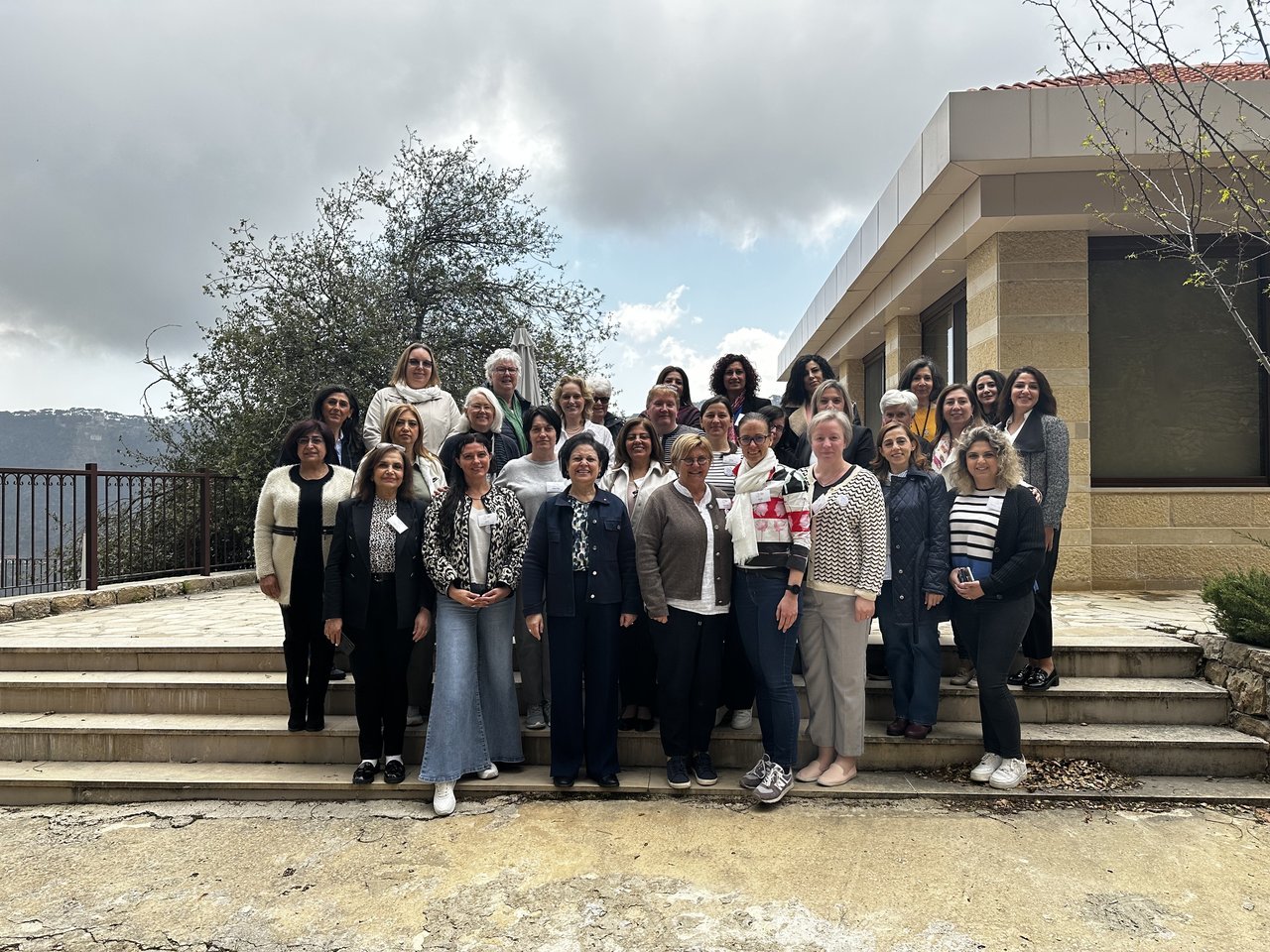
Participants of the 'Unheard Voice' conference
It was not only the uncertain situation in Lebanon that made it difficult for Tímea to leave: as a pastor in the village of Csongor (Chomonyn), a majority Hungarian populated settlement in Transcarpathia, Western Ukraine, she had to allocate time out of her intensive ministry to prepare the Bible study and the sermon in English for the conference. She had longed to meet Syrian and Lebanese pastors who visited Transcarpathia after the escalation of the Russian-Ukrainian war in 2022, and had already considered how much she needed a meeting where women in war could talk about how to get through it all. Yet, before the trip, Tímea felt she was falling from one task to another.
Weary, discouraged and perhaps a little even hopeless after more than three years of the often desperate situation in Ukraine, she and six other women arrived in Beirut after a long flight with an overnight layover. She had no idea of the rich spiritual gifts the next four days would hold for her.
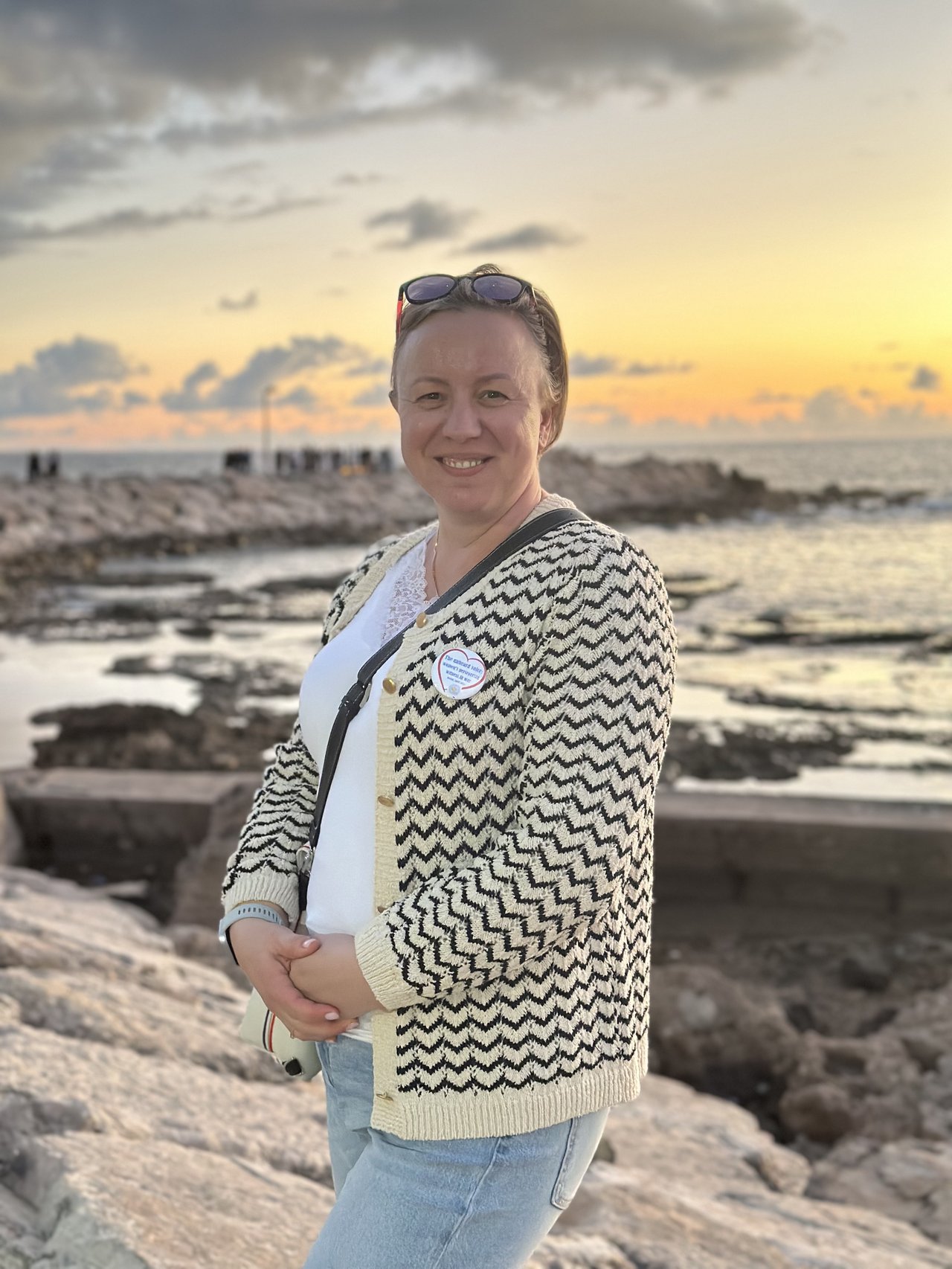
Tímea Tövissi, pastor of the Reformed Church in Transcarpathia, Ukraine
The conference entitled “The Unheard Voice: Women’s Persevering Witness in War” was the first stage of an international initiative, which has since been followed by several online meetings, with a follow-up event planned for the future. During the intensive three-day programme, Bible studies in English, panel discussions and informal programmes alternated. Representatives of three Christian organisations, Júlia Berecz, Ecumenical Officer of the Reformed Church in Hungary (RCH), Martina Wasserloos-Strunk, President of the European Area Council of the World Communion of Reformed Churches (WCRC), and Najla Kassab, Pastor of the National Evangelical Synod of Syria and Lebanon (NESSL) and President of WCRC, prepared and coordinated the international event.
In addition to Julia and Tímea, Mária Beszédes, pastor of Torontálvásárhely in Serbia and Dean of the Reformed Christian Church in Serbia, Dóra Kacsó and Katalin Szeghljánik, pastors' wives from Transcarpathia, Krisztina Badó, head of the Bishop’s office of the Reformed Church in Transcarpathia, and Zsuzsanna Pálfi, representative of the Hungarian Reformed Women's Association, joined them.
The meeting was attended by 30 participants, including Lebanese, Syrian, Armenian, German and Northern Irish women, who gathered in Dhour El Choueir, a small mountain town 40 kilometres from Beirut. The town was on the frontline of the Lebanese civil war from 1975 to 1990, and its townscape still bears the memory of the armed conflict, thirty-five years later. The evangelical conference centre, which hosted the April event, was built on the outskirts of the town amidst the devastation of the civil war.
The breathtaking high-altitude views, the cultivated surroundings and the sight of cedar trees swaying in the courtyard made the Hungarian delegation feel very welcome. At night, however, the echoes of bombs falling in the distance, amplified by the sea and the mountains, made it difficult to rest in peace...
WE CLING TO THE SAME GOD
How are you? - is the well-intentioned question to which, after more than three years, the weary Transcarpathian answers simply: "Thank you, I'm fine..." It would take too long to describe what it is like to live day by day without being able to predict tomorrow, let alone the next few months; to live with more and more people disappearing from our environment; to live in constant fear for the lives of husbands, sons and fathers; to stand alone in their absence in the face of an escalating political and economic crisis.
It is easier to say, thank you, I am fine. But when you are approached by a fellow human being who has fled the front line, who fears for her daughters from rampaging bandits, whose church has been burned down, who has been shot at, your stories come together, and language is more easily resolved. This was the experience of the participants in the Lebanese meeting, where all women carried losses and burdens that no one should ever have to experience. From the very first day, Tímea felt as if she had always known the others; shared faith and similar life situations set the tone. It was also a pleasant surprise that several of our Reformed hymns were also known in Arabic and English, so that in different languages, but praising the same Lord, the lovely hymn "Always with me, Lord..."
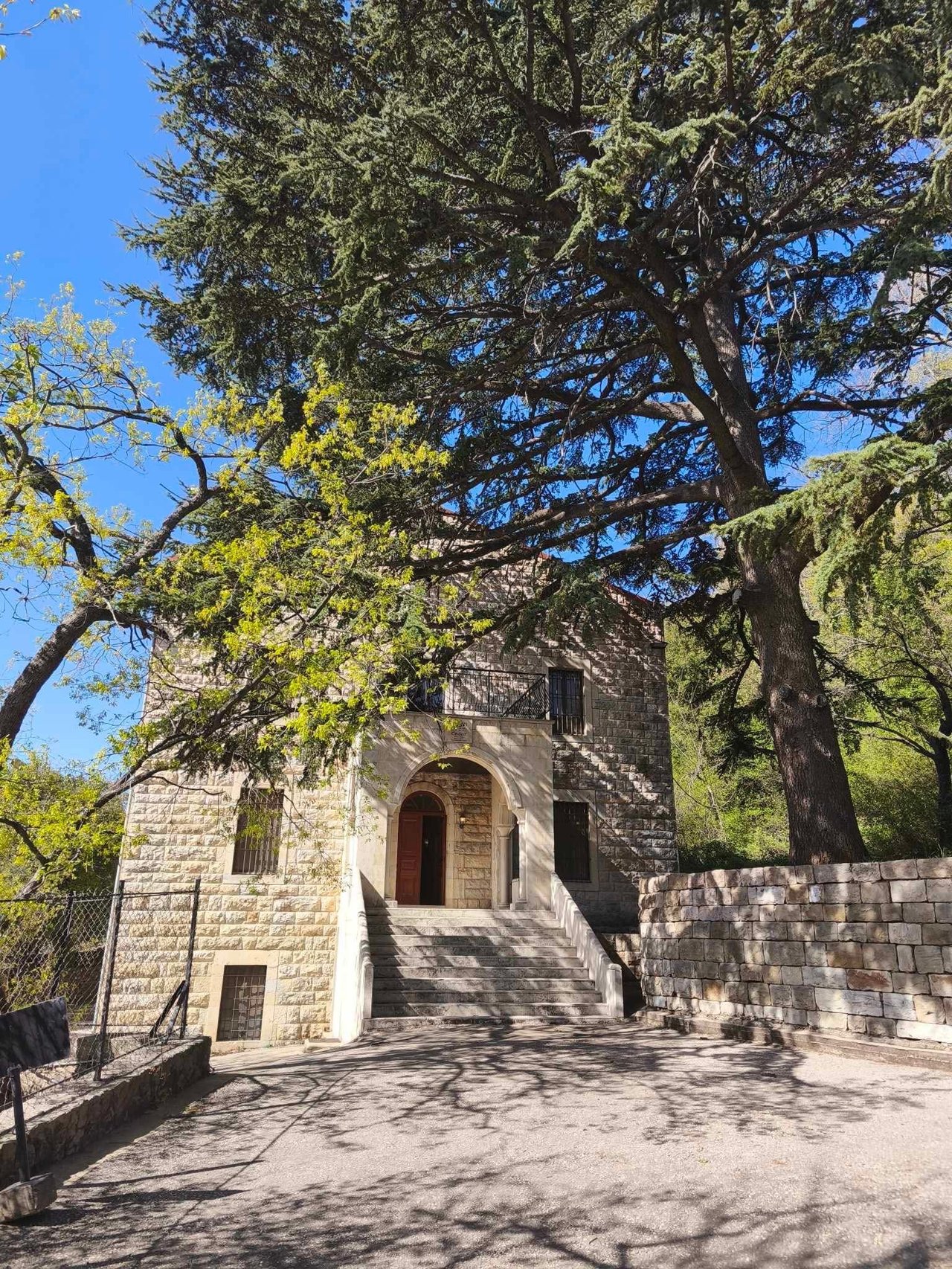
Safe space under the shadow of the cedar
The aim of the three days of presentations and discussions was to bring out the often silenced voices, experiences and testimonies of women who have lived through war situations in the past or are currently living through them, and to call Christian women who have stood their ground in war to silence and strength before God. It is indisputable that everyone suffers because of warfare, but in many ways, it is the women who bear the greatest burden, since they are the ones who have to provide for the remaining family and household in a hopeless situation. They have to hold on to the end of their work just as they did before the war, while taking on their faith, not without risk.
Several participants at the conference told of being left to wallow in their daily lives at the mercy of war, carrying the horrors and terrors they had experienced with them as permanent scars for generations. These women's experiences cannot be silenced when the world wants to go to war. We are aware that we do not decide on truce and peace, that it is in the hands of politicians by God's will, but it would be good to listen to each other. The only way we can make peace is if one of the parties says: enough of this, I want you to know what I have been through!
In a noisy, fast-paced world, it can be hard to hear each other's voices, but it's the only way to survive in human relationships. We can become each other's encouragers and supporters by noticing what is going on in each other. Let us not wait for war to be over to make time for our children, our elderly parents, our spouses, our relationships! Let us not chase glory, material comfort, or sacrifice our lives on the altar of work! For all this is nothing from the perspective of the kingdom of God.
FROM ANGER TO HOPE
Emotions give rise to passions, and hatred gives rise to more hatred. We tend to take a human view of events: we look with disgust at those on the opposite side, we are angry at leaders who are in their place with God's knowledge, even if he has hardened their hearts. But if hatred is also our elemental reaction as believers, then we fail to validate what Christ wants us to stand for. According to Tímea, it is a lie to say that believers do not ask the question: why did God allow wars and the suffering that comes with them?
The answer lies in the Word: the Lord has never hidden the fact that there will be wars, that there will be horrors, but he also warns his people not to be afraid of them. We need to remind ourselves again and again: the Creator is sovereign, He looks at our lives and the world on a much higher level than we do.
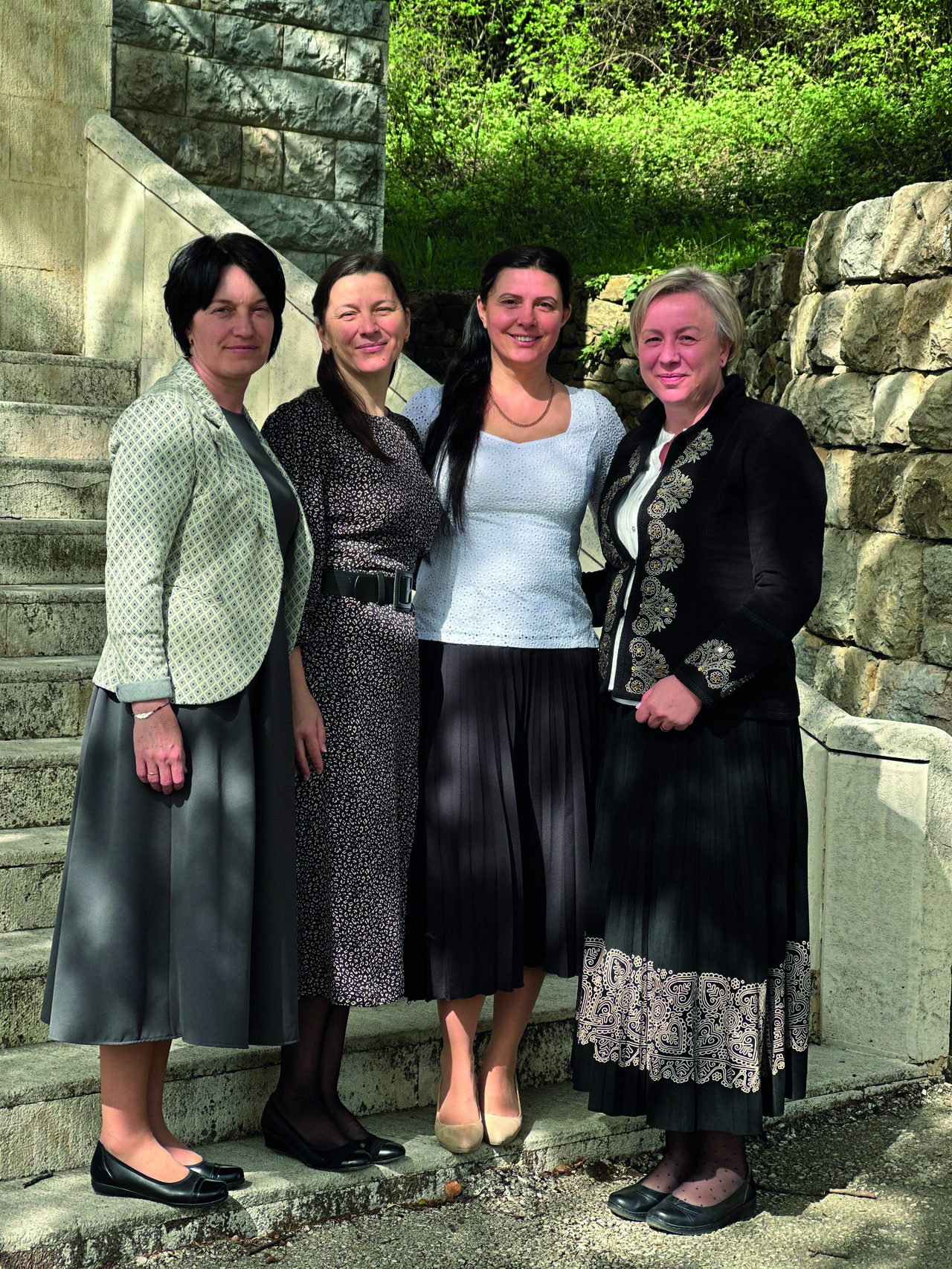
Delegates from Transcarpathia: Krisztina Badó, Dóra Kacsó, Katalin Szeghljánik, Tímea Tövissi
The Bible also tells us that we do not have to shut out our instinctive anger and despair from God, but can pour out our anger, despair and accusations to him. Take the example of the psalmist, who, even in his deepest state of mind, throws what boils inside him at the heavens without pretence.
“Let us give ourselves time to be angry, and let us say so honestly to God! Only then can the soul be set free. The Father is very patient, because sometimes I tell Him too much... He is also in control of situations in which we no longer have the ground under our feet," declares the pastor from Csongor. Instead of the accusatory question "why did he let this happen", she turns the question around: what is God trying to work out in me, what does He want to teach me in this trial?
“When I had nothing left, when I had grown weary of my anger, when I felt that I could no longer bear it, then I understood how God wanted to use my life in this miserable situation. I realised that I had no strength for anything; that's when the Lord comes, fills me with His strength and helps me in what He wants to lead me in. This experience was echoed in the personal testimonies of the conversations in Lebanon. Most of them reported joy in the tasks in which God has placed them. And as long as they have joy, they are able to continue to act," shares Tímea Tövissi.
STAYED WITH THEM UNTIL THE AUTUMN RAINS
Ricpa, who protected her hanged sons from birds of prey and wild animals for months, was one of the biblical women figures who were held up as encouraging examples during the Lebanon conference presentations. The pain of losing her family did not paralyse Saul's second wife, she steadfastly guarded those murdered in the war in Israel until David gave them a dignified burial. Rima Nasrallah, a professor at the Middle East Theological College, used the Old Testament story to emphasise that God blesses the perseverance of women who have lived through war and, despite their weaknesses and grief, are not afraid to point out what is not according to God. Tímea Tövissi preached the Word during Sunday's service, based on the book of Esther, which has been such an encouragement to her.
The local congregation also heard a summary of the sermon in Arabic. The 30 participants also enjoyed an interactive Bible study, using the parable of the prodigal son as a basis for a discussion about the Father's qualities that He wants to work out in us as we live our lives. This formation can sometimes take decades, but it can destroy God's work in an instant.
At the conference, Ann Artin, a member of the Women's volunteering group of the National Evangelical Synod of Syria and Lebanon, brought the story of Rachel, who wept loudly and bitterly for her sons, to the participants. In the book of Jeremiah, we read the Lord's promise: the reward of suffering will be given. Just as Benoni, the son of sorrow, will become Benjamin, the son of strength, so the people will return to the land of Israel. Even today, God does not forget the women in distress; He sees them and takes account of them.
During the panel discussion, Tímea spoke openly about the three emotional phases we can sink into in any crisis, which she has experienced since the attacks that began in 2022. The first of these is self-pity, which is easy to get trapped in. She felt it too, when more and more people left Transcarpathia to escape the war, including many brothers and parishoners from their church. If we only revolve around ourselves, we cannot listen to others.
Tímea testified of how God has lifted her out of the deepening pit of self-pity. She was angry with those who had made the easy decision to change countries; angry with herself for not daring to or not being able to take that step; and angry with God for not allowing her to step out of her situation. She listened to her emotions, but with the Lord's leading and guidance, her relationship with the heavens of the earth was set right. The third stage is burnout, when the world around us becomes dull and monotonous, and we no longer notice that we find joy in anything. God can lift us out of this state, too, says Tímea, citing Elijah, the most fallen man in Scripture, as an example.
“God did not allow him to remain in a spiritual pit. This message gives us strength again and again. I may not be able to do much more now, I may just sleep and eat, but the Lord will show us what we have to do, because there is always something to do," the pastor declares.
TO PLUNGE IN AND NOT SINK
How can we begin the long process of reconciliation in our environment? Can we patch up the holes left by tragedies in our communities? The short story told at the conference points the way: a farmer, before leaving, orders his servant to build a huge fence on the boundary of his property, which will cut him off from his neighbour, with whom he has been feuding for years. However, when he returns home, he finds not a fence but a bridge between the two gates. In a fit of rage, he questions the servant as to why he has not obeyed his orders.
The servant replies: you may have wanted a fence, but if you change your mind on the way, you can cross this bridge to your neighbour's house. “This is the kind of bridge-building encouraged by the Lebanese meeting: let the Lord calm us down and only then react to a situation,” says Tímea. She adds that, after three years, many have been calmed or encouraged to ask God's advice on the direction their lives should take: whether to leave their homeland or stay and, if they do, to come to terms with the increasingly difficult circumstances they will have to face.
“And the only way to do that is to give ourselves time. Sometimes we cry with those we encourage, sometimes we deal with tragicomic situations with humour. But always together, earnestly asking God's guidance in a life situation. As a pastor dealing with people, I must somehow take on the role of encouragement. But for this, I need God to encourage me first, otherwise I cannot be a support for others," says Tímea.
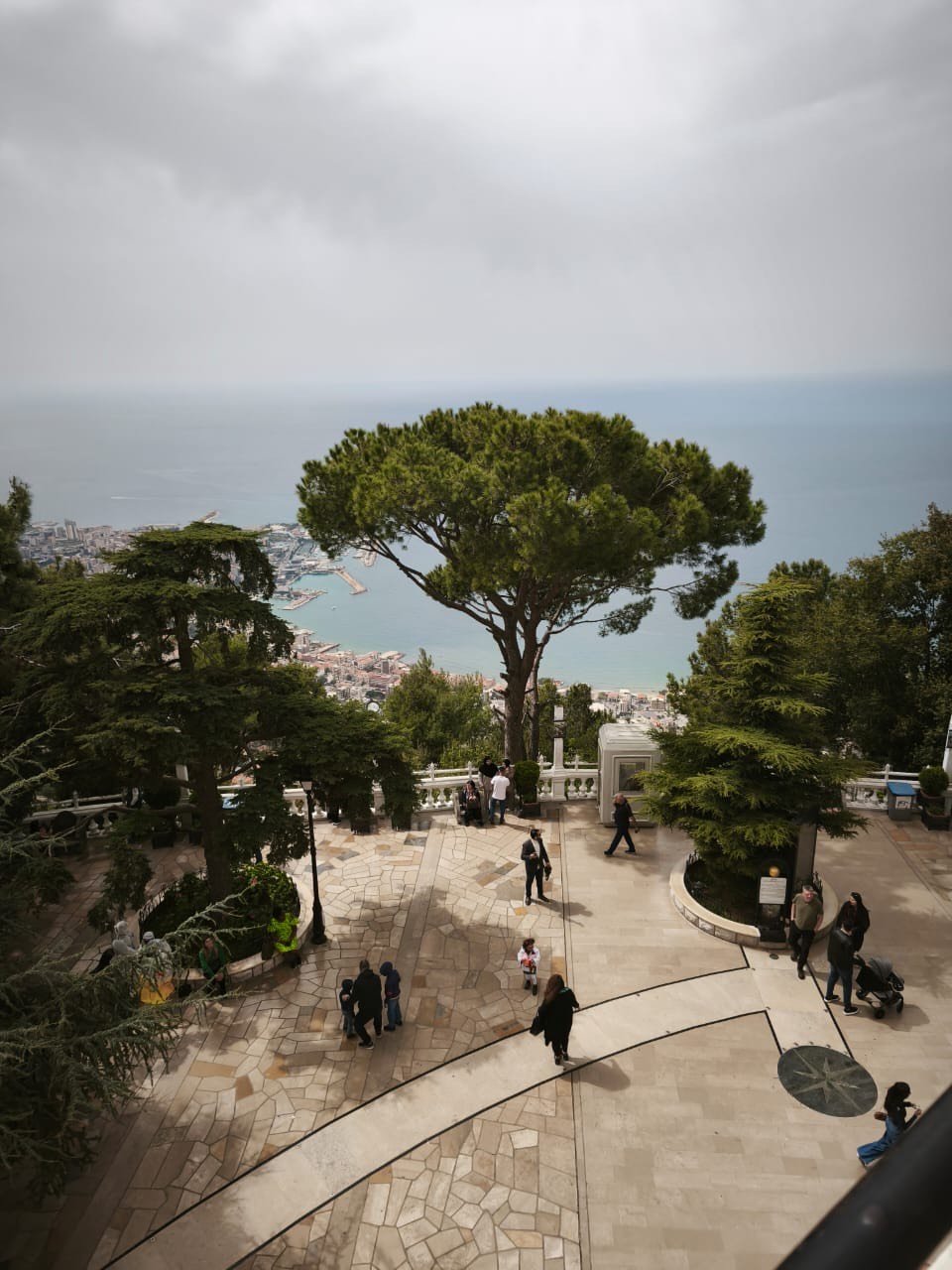
Tímea Tövissi: we felt on the first day that we will receive way more than we thought
Indeed, encouragers need encouragement, even our own! Tímea says that the best way to help people in difficult circumstances is to take the time to call, visit and really ask, not just give a cliché answer. Life goes on relentlessly: financial problems, marital burdens, illnesses, child-rearing problems, and the enormous spiritual uncertainty of war. That is why the greatest help is to ask and to pray: if you do not seek, you are struggling within yourself. But let's not forget our brothers and sisters in Transcarpathia who had to start their lives in Hungary almost or completely from scratch: let's reach out to them in the church and in school, because integration into the community can only be achieved with openness!
ALWAYS WITH ME, LORD!
The meeting ended with an intimate communion and personal farewells, where the reflections of the weekend were expressed. Despite the distances, the fraternal ties forged here have continued to live on in prayer groups and conversations. Over the four days, Tímea experienced a real emotional roller coaster ride, from shock to wonder, from tears to the momentum of hope. Already on the first day, she experienced how much more she had received than she expected. “It means a lot when you feel understood," the pastor concludes. She has been extremely encouraged to see other women bearing their burdens for God, and this has given her a new impetus for ministry at home. A women's weekend of silence awaited her on her return home. The audience also commented that something different and more radiated from Tímea: she had received in Lebanon, so she was able to give much more.
The Unheard Voice
On April 3-5th, women from Syria, Lebanon, Ukraine, and Northern Ireland came together to share their stories of faith and perseverance in conflict. The conference, entitled “The Unheard Voice: Women’s Persevering Witness in War,” served as a space for testimony, reflection, and solidarity, offering a powerful witness to the strength and hope found in the face of hardship. Though each woman came from a different background and context, their voices echoed a shared resilience grounded in their faith and communities.